- Home
- Alice Munro
Julieta (Movie Tie-in Edition) Page 3
Julieta (Movie Tie-in Edition) Read online
Page 3
She went back to her own seat. Across from her, a child four or five years old was slashing a crayon across the pages of a coloring book. His mother spoke to Juliet about the free coffee.
“It may be free but it looks like you have to go and get it yourself,” she said. “Would you mind watching him while I go?”
“I don’t want to stay with her,” the child said, without looking up.
“I’ll go,” said Juliet. But at that moment a waiter entered the car with the coffee wagon.
“There. I shouldn’t’ve complained so soon,” the mother said. “Did you hear it was a b-o-d-y?”
Juliet shook her head.
“He didn’t have a coat on even. Somebody saw him get off and walk on up ahead but they never realized what he was doing. He must’ve just got round the curve so the engineer couldn’t see him till it was too late.”
A few seats ahead, on the mother’s side of the aisle, a man said, “Here they come back,” and some people got up, from Juliet’s side, and stooped to see. The child stood up too, pressed his face to the glass. His mother told him to sit down.
“You color. Look at the mess you made, all over the lines.”
“I can’t look,” she said to Juliet. “I can’t stand to look at anything like that.”
Juliet got up and looked. She saw a small group of men tramping back towards the station. Some had taken off their coats, which were piled on top of the stretcher that a couple of them were carrying.
“You can’t see anything,” a man behind Juliet said to a woman who had not stood up. “They got him all covered.”
Not all of the men who proceeded with their heads lowered were railway employees. Juliet recognized the man who had sat across from her up in the observation car.
After ten or fifteen minutes more, the train began to move. Around the curve there was no blood to be seen, on either side of the car. But there was a trampled area, a shovelled mound of snow. The man behind her was up again. He said, “That’s where it happened, I guess,” and watched for a little while to see if there was anything else, then turned around and sat down. The train, instead of speeding to make up for lost time, seemed to be going more slowly than previously. Out of respect, perhaps, or with apprehension about what might lie ahead, around the next curve. The headwaiter went through the car announcing the first seating for lunch, and the mother and child at once got up and followed him. A procession began, and Juliet heard a woman who was passing say, “Really?”
The woman talking to her said softly, “That’s what she said. Full of blood. So it must have splashed in when the train went over—”
“Don’t say it.”
—
A little later, when the procession had ended and the early lunchers were eating, the man came through—the man from the observation car who had been seen outside walking in the snow.
Juliet got up and quickly pursued him. In the black cold space between the cars, just as he was pushing the heavy door in front of him, she said, “Excuse me. I have to ask you something.”
This space was full of sudden noise, the clanking of heavy wheels on the rails.
“What is it?”
“Are you a doctor? Did you see the man who—”
“I’m not a doctor. There’s no doctor on the train. But I have some medical experience.”
“How old was he?”
The man looked at her with a steady patience and some displeasure.
“Hard to say. Not young.”
“Was he wearing a blue shirt? Did he have blondish-brown-colored hair?”
He shook his head, not to answer her question but to refuse it.
“Was this somebody you knew?” he said. “You should tell the conductor if it was.”
“I didn’t know him.”
“Excuse me, then.” He pushed open the door and left her.
Of course. He thought she was full of disgusting curiosity, like many other people.
Full of blood. That was disgusting, if you liked.
She could never tell anybody about the mistake that had been made, the horrid joke of it. People would think her exceptionally crude and heartless, were she ever to speak of it. And what was at one end of the misunderstanding—the suicide’s smashed body—would seem, in the telling, to be hardly more foul and frightful than her own menstrual blood.
Never tell that to anybody. (Actually she did tell it, a few years later, to a woman named Christa, a woman whose name she did not yet know.)
But she wanted very much to tell somebody something. She got out her notebook and on one of its ruled pages began to write a letter to her parents.
We have not yet reached the Manitoba border and most people have been complaining that the scenery is rather monotonous but they cannot say that the trip has been lacking in dramatic incident. This morning we stopped at some godforsaken little settlement in the northern woods, all painted Dreary Railway Red. I was sitting at the back of the train in the Observation Car, and freezing to death because they skimp on the heat up there (the idea must be that the scenic glories will distract you from your discomfort) and I was too lazy to trudge back and get my sweater. We sat around there for ten or fifteen minutes and then started up again, and I could see the engine rounding a curve up ahead, and then suddenly there was a sort of Awful Thump…
She and her father and her mother had always made it their business to bring entertaining stories into the house. This had required a subtle adjustment not only of the facts but of one’s position in the world. Or so Juliet had found, when her world was school. She had made herself into a rather superior, invulnerable observer. And now that she was away from home all the time this stance had become habitual, almost a duty.
But as soon as she had written the words Awful Thump, she found herself unable to go on. Unable, in her customary language, to go on.
She tried looking out the window, but the scene, composed of the same elements, had changed. Less than a hundred miles on, it seemed as if there was a warmer climate. The lakes were fringed with ice, not covered. The black water, black rocks, under the wintry clouds, filled the air with darkness. She grew tired watching, and she picked up her Dodds, opening it just anywhere, because, after all, she had read it before. Every few pages she seemed to have had an orgy of underlining. She was drawn to these passages, but when she read them she found that what she had pounced on with such satisfaction at one time now seemed obscure and unsettling.
…what to the partial vision of the living appears as the act of a fiend, is perceived by the wider insight of the dead to be an aspect of cosmic justice…
The book slipped out of her hands, her eyes closed, and she was now walking with some children (students?) on the surface of a lake. Everywhere each of them stepped there appeared a five-sided crack, all of these beautifully even, so that the ice became like a tiled floor. The children asked her the name of these ice tiles, and she answered with confidence, iambic pentameter. But they laughed and with this laughter the cracks widened. She realized her mistake then and knew that only the right word would save the situation, but she could not grasp it.
She woke and saw the same man, the man she had followed and pestered between the cars, sitting across from her.
“You were sleeping.” He smiled slightly at what he had said. “Obviously.”
She had been sleeping with her head hanging forward, like an old woman, and there was a dribble at the corner of her mouth. Also, she knew she must get to the Ladies Toilet at once, hoping there was nothing on her skirt. She said “Excuse me” (just what he had last said to her) and took up her case and walked away with as little self-conscious haste as she could manage.
When she came back, washed and tidied and reinforced, he was still there.
He spoke at once. He said that he wanted to apologize.
“It occurred to me I was rude to you. When you asked me—”
“Yes,” she said.
“You had it right,” he said. “The way you describ
ed him.”
This seemed less an offering, on his part, than a direct and necessary transaction. If she did not care to speak he might just get up and walk away, not particularly disappointed, having done what he’d come to do.
Shamefully, Juliet’s eyes overflowed with tears. This was so unexpected that she had no time to look away.
“Okay,” he said. “It’s okay.”
She nodded quickly, several times, sniffled wretchedly, blew her nose on the tissue she eventually found in her bag.
“It’s all right,” she said, and then she told him, in a straightforward way, just what had happened. How the man bent over and asked her if the seat was taken, how he sat down, how she had been looking out the window and how she couldn’t do that any longer so she had tried or had pretended to read her book, how he had asked where she had got on the train, and found out where she lived, and kept trying to make headway with the conversation, till she just picked up and left him.
The only thing she did not reveal to him was the expression chum around. She had a notion that if she were to say that she would burst into tears all over again.
“People interrupt women,” he said. “Easier than men.”
“Yes. They do.”
“They think women are bound to be nicer.”
“But he just wanted somebody to talk to,” she said, shifting sides a little. “He wanted somebody worse than I didn’t want somebody. I realize that now. And I don’t look mean. I don’t look cruel. But I was.”
A pause, while she once more got her sniffling and her leaky eyes under control.
He said, “Haven’t you ever wanted to do that to anybody before?”
“Yes. But I’ve never done it. I never have gone so far. And why I did it this time—it was that he was so humble. And he had all new clothes on he’d probably bought for the trip. He was probably depressed and thought he’d go on a trip and it was a good way to meet people and make friends.
“Maybe if he’d just been going a little way—,” she said. “But he said he was going to Vancouver and I would have been saddled with him. For days.”
“Yes.”
“I really might have been.”
“Yes.”
“So.”
“Rotten luck,” he said, smiling a very little. “The first time you get up the nerve to give somebody the gears he throws himself under a train.”
“It could have been the last straw,” she said, now feeling slightly defensive. “It could have been.”
“I guess you’ll just have to watch out, in future.”
Juliet raised her chin and looked at him steadily.
“You mean I’m exaggerating.”
Then something happened that was as sudden and unbidden as her tears. Her mouth began to twitch. Unholy laughter was rising.
“I guess it is a little extreme.”
He said, “A little.”
“You think I’m dramatizing?”
“That’s natural.”
“But you think it’s a mistake,” she said, with the laughter under control. “You think feeling guilty is just an indulgence?”
“What I think is—,” he said. “I think that this is minor. Things will happen in your life—things will probably happen in your life—that will make this seem minor. Other things you’ll be able to feel guilty about.”
“Don’t people always say that, though? To somebody who is younger? They say, oh, you won’t think like this someday. You wait and see. As if you didn’t have a right to any serious feelings. As if you weren’t capable.”
“Feelings,” he said. “I was talking about experience.”
“But you are sort of saying that guilt isn’t any use. People do say that. Is it true?”
“You tell me.”
They went on talking about this for a considerable time, in low voices, but so forcefully that people passing by sometimes looked astonished, or even offended, as people may when they overhear debates that seem unnecessarily abstract. Juliet realized, after a while, that though she was arguing—rather well, she thought—for the necessity of some feelings of guilt both in public and in private life, she had stopped feeling any, for the moment. You might even have said that she was enjoying herself.
He suggested that they go forward to the lounge, where they could drink coffee. Once there Juliet discovered that she was quite hungry, though the lunch hours were long over. Pretzels and peanuts were all that could be procured, and she gobbled them up in such a way that the thoughtful, slightly competitive conversation they were having before was not retrievable. So they talked instead about themselves. His name was Eric Porteous, and he lived in a place called Whale Bay, somewhere north of Vancouver, on the west coast. But he was not going there immediately, he was breaking the trip in Regina, to see some people he had not seen for a long time. He was a fisherman, he caught prawns. She asked about the medical experience he had referred to, and he said, “Oh, it’s not very extensive. I did some medical study. When you’re out in the bush or on the boat anything can happen. To the people you’re working with. Or to yourself.”
He was married, his wife’s name was Ann.
Eight years ago, he said, Ann had been injured in a car accident. For several weeks she was in a coma. She came out of that, but she was still paralyzed, unable to walk or even to feed herself. She seemed to know who he was, and who the woman who looked after her was—with the help of this woman he was able to keep her at home—but her attempts to talk, and to understand what was going on around her, soon faded away.
They had been to a party. She hadn’t particularly wanted to go but he had wanted to go. Then she decided to walk home by herself, not being very happy with things at the party.
It was a gang of drunks from another party who ran off the road and knocked her down. Teenagers.
Luckily, he and Ann had no children. Yes, luckily.
“You tell people about it and they feel they have to say, how terrible. What a tragedy. Et cetera.”
“Can you blame them?” said Juliet, who had been about to say something of the sort herself.
No, he said. But it was just that the whole thing was a lot more complicated than that. Did Ann feel that it was a tragedy? Probably not. Did he? It was something you got used to, it was a new kind of life. That was all.
—
All of Juliet’s enjoyable experience of men had been in fantasy. One or two movie stars, the lovely tenor—not the virile heartless hero—on a certain old recording of Don Giovanni. Henry V, as she read about him in Shakespeare and as Laurence Olivier had played him in the movie.
This was ridiculous, pathetic, but who ever needed to know? In actual life there had been humiliation and disappointment, which she had tried to push out of her mind as quickly as possible.
There was the experience of being stranded head and shoulders above the gaggle of other unwanted girls at the high school dances, and being bored but making a rash attempt to be lively on college dates with boys she didn’t much like, who did not much like her. Going out with the visiting nephew of her thesis adviser last year and being broken into—you couldn’t call it rape, she too was determined—late at night on the ground in Willis Park.
On the way home he had explained that she wasn’t his type. And she had felt too humiliated to retort—or even to be aware, at that moment—that he was not hers.
She had never had fantasies about a particular, real man—least of all about any of her teachers. Older men—in real life—seemed to her to be slightly unsavory.
This man was how old? He had been married for at least eight years—and perhaps two years, two or three years, more than that. Which made him probably thirty-five or thirty-six. His hair was dark and curly with some gray at the sides, his forehead wide and weathered, his shoulders strong and a little stooped. He was hardly any taller than she was. His eyes were wide set, dark, and eager but also wary. His chin was rounded, dimpled, pugnacious.
She told him about her job, the name of the sc
hool—Torrance House. (“What do you want to bet it’s called Torments?”) She told him that she was not a real teacher but that they were glad to get anybody who had majored in Greek and Latin at college. Hardly anybody did anymore.
“So why did you?”
“Oh, just to be different, I guess.”
Then she told him what she had always known that she should never tell any man or boy, lest he lose interest immediately.
“And because I love it. I love all that stuff. I really do.”
They ate dinner together—each drinking a glass of wine—and then went up to the observation car, where they sat in the dark, all by themselves. Juliet had brought her sweater this time.
“People must think there’s nothing to see up here at night,” he said. “But look at the stars you can see on a clear night.”
Indeed the night was clear. There was no moon—at least not yet—and the stars appeared in dense thickets, both faint and bright. And like anyone who had lived and worked on boats, he was familiar with the map of the sky. She was able to locate only the Big Dipper.
“That’s your start,” he said. “Take the two stars on the side of the Dipper opposite the handle. Got them? Those are the pointers. Follow them up. Follow them, you’ll find the polestar.” And so on.
He found for her Orion, which he said was the major constellation in the Northern Hemisphere in winter. And Sirius, the Dog Star, at that time of year the brightest star in the whole northern sky.
Juliet was pleased to be instructed but also pleased when it came her turn to be the instructor. He knew the names but not the history.
She told him that Orion was blinded by Enopion but had got his sight back by looking at the sun.
“He was blinded because he was so beautiful, but Hephaestus came to his rescue. Then he was killed anyway, by Artemis, but he got changed into a constellation. It often happened when somebody really valuable got into bad trouble, they were changed into a constellation. Where is Cassiopeia?”
He directed her to a not very obvious W.
“It’s supposed to be a woman sitting down.”
“That was on account of beauty too,” she said.

 Runaway
Runaway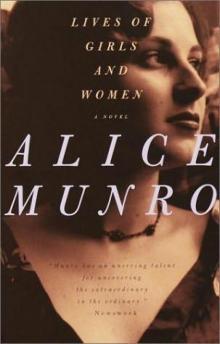 Lives of Girls and Women
Lives of Girls and Women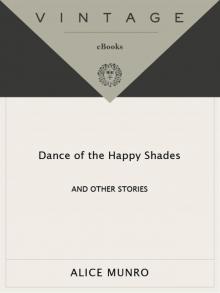 Dance of the Happy Shades
Dance of the Happy Shades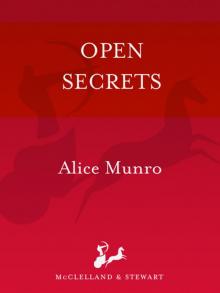 Open Secrets
Open Secrets Julieta (Movie Tie-in Edition)
Julieta (Movie Tie-in Edition)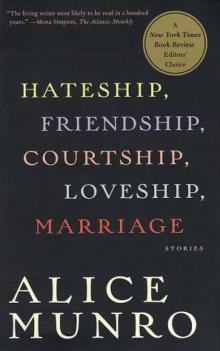 Hateship, Friendship, Courtship, Loveship, Marriage: Stories
Hateship, Friendship, Courtship, Loveship, Marriage: Stories Alice Munro's Best
Alice Munro's Best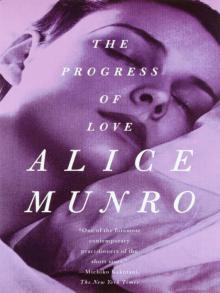 The Progress of Love
The Progress of Love Selected Stories
Selected Stories Away from Her
Away from Her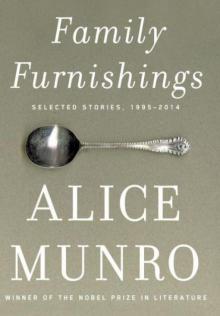 Family Furnishings
Family Furnishings Moons of Jupiter
Moons of Jupiter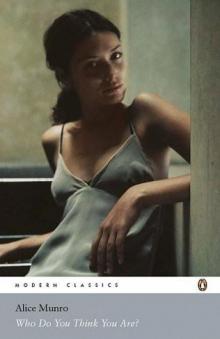 Who Do You Think You Are?
Who Do You Think You Are?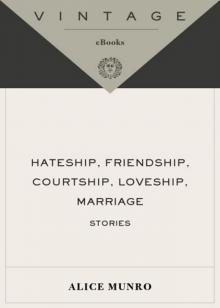 Hateship, Friendship, Courtship, Loveship, Marriage
Hateship, Friendship, Courtship, Loveship, Marriage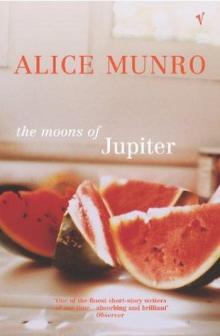 The Moons of Jupiter
The Moons of Jupiter Vintage Munro
Vintage Munro The Love of a Good Woman
The Love of a Good Woman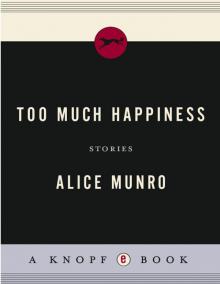 Too Much Happiness
Too Much Happiness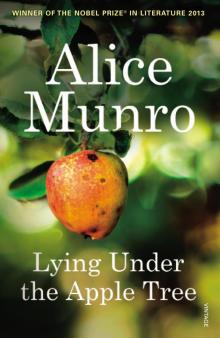 Lying Under the Apple Tree
Lying Under the Apple Tree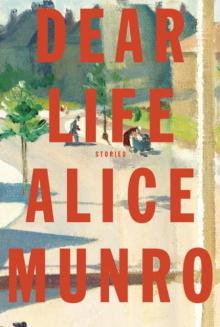 Dear Life
Dear Life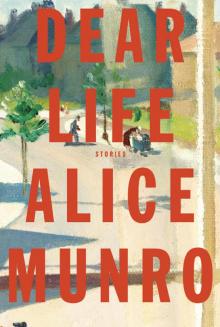 Dear Life: Stories
Dear Life: Stories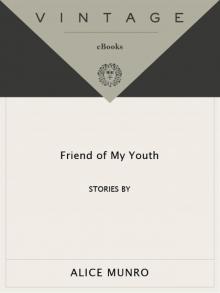 Friend of My Youth
Friend of My Youth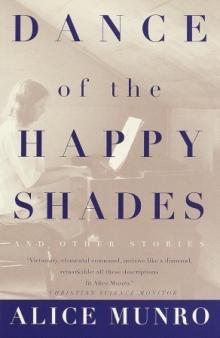 Dance of the Happy Shades: And Other Stories
Dance of the Happy Shades: And Other Stories The Beggar Maid
The Beggar Maid